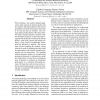Free Online Productivity Tools
i2Speak
i2Symbol
i2OCR
iTex2Img
iWeb2Print
iWeb2Shot
i2Type
iPdf2Split
iPdf2Merge
i2Bopomofo
i2Arabic
i2Style
i2Image
i2PDF
iLatex2Rtf
Sci2ools
125
click to vote
LRE
2006
2006
Automatic induction of language model data for a spoken dialogue system
When building a new spoken dialogue application, large amounts of domain specific data are required. This paper addresses the issue of generating in-domain training data when little or no real user data are available. The twostage approach taken begins with a data induction phase whereby linguistic constructs from out-of-domain sentences are harvested and integrated with artificially constructed in-domain phrases. After some syntactic and semantic filtering, a large corpus of synthetically assembled user utterances is induced. The second stage involves sampling the synthetic corpus towards the goal of obtaining data that would be representative of the statistics of applicationspecific real user interactions. The sampling methods proposed employ an example-based generation framework, a simulated user model and information extracted from development data. Evaluation is conducted on recognition performance in a restaurant information domain. We show that word error rate can be reduced wh...
LRE 2006 | Real User | Real User Data | Training Data |
Related Content
| Added | 14 Dec 2010 |
| Updated | 14 Dec 2010 |
| Type | Journal |
| Year | 2006 |
| Where | LRE |
| Authors | Chao Wang, Grace Chung, Stephanie Seneff |
Comments (0)

